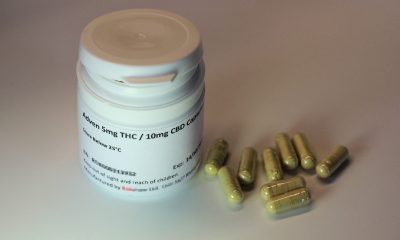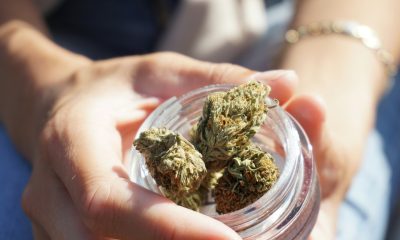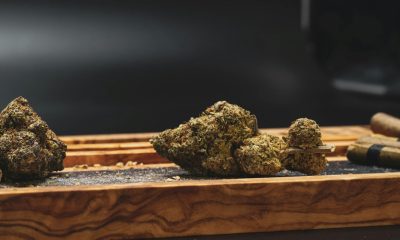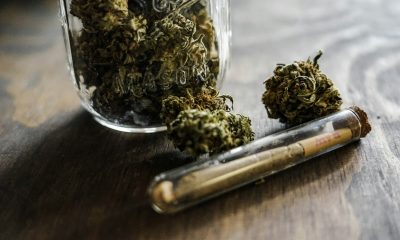Cannabis
Argentina opens new spaces for testing cannabis oils
Cannabis testing allows consumers to make informed purchasing decisions based on the strength and composition of cannabis products. Accurate testing is crucial for medical cannabis patients who need specific therapeutic effects. In addition to the test, those doing the analysis can complete a questionnaire to find out what type of demand led them to produce or buy the oil.

This Friday Conicet authorities will present a new space for testing cannabis oils in Buenos Aires. This service will enable doctors and their patients to understand what is actually in their cannabis & cbd. According to Télam, the new testing facility will be located at El Cruce Hospital in Florencio Varela.
The latest CBD & Cannabis updates are now at your fingertips, with notifications and fresh information offered by the CBD News App. Stay up-to-date with marijuana stocks for investments, global market, cannabis legalization and more. CBD News is a mobile app that focuses exclusively on CBD. It brings you the very latest news in the CBD industry.
Conicet Cannabis Network next step
The initiative is another step of the Conicet Cannabis Network and the expectation is to know if it will be offered in other institutes of the country that have the equipment to do it. At Coniciet Rosario, its deputy director, Cristina Carrillo admitted to El Ciudadano that it would not be necessary since there is one in operation at UNR. For years the oil bottles started to move in the houses of Argentina, and not only for patients with epilepsy or neurological problems. They reached out to grandparents and how many people felt it would be good for them. Some people would first consult a doctor.
One of the problems is getting it done: the laws that enable the cannabis medical use in Argentina left a few roads to get the oil. It only arrives from outside in exchange for dollars and prior authorization from Nación. For many, the alternative was to plant cannabis and harvest it at home, even though they knew of the danger and persecution of Justice. Also, since it was not a product manufactured on an industrial scale, few knew what homemade oils have and if it could help them with their pain.
Pioneering city
Oil testing in Santa Fe began at UNR between 2016 and 2017. The place: the Unit of Optimization of Pharmacotherapy (UOF) of the Faculty of Biochemistry, where they had begun to receive people who wanted to know if taking cannabis oil could alter the rest of the pills they took. That group of scientists were used to studying how the remedies co-worked inside the body, but they had never had such a demand.
The Dean of Biochemistry, Esteban Serra, set up an outreach program to test the oils and thus give back to those who used them the detail of what they were taking so that a doctor could define a safe and effective treatment. It lasted 18 months and the samples arrived thanks to the associations Arec, Aupac and the Maria Victoria Foundation, which assist people in treatment and information about cannabis in Rosario. In that time they discovered that 8 percent of the 473 samples were almost free of THC and CBD, two of the plant’s most well-known components and still undergoing analysis for potential medical uses.
After the extension project, the UNR took the program as stable but tariffed it. They took the 9th-floor room of the Centenario Hospital (Urquiza 3101) as their headquarters to receive the samples. Due to the cost and necessity, the province signed an agreement in December to pay 100 tests to mothers of boys and girls in the city of Santa Fe who suffer from different diseases and where no equipment was provided for the tests.
The tube and the instructions that guarantee anonymity can be found at the Centenario Hospital from Monday to Friday from 8 to 12. The sample can be presented at the same place on the first and second Friday of each month at the same time. Once a month the authorities of the Chromatography and Mass Spectrometry Laboratory of the UOF analyze the samples that arrive. The result is sent to the user’s e-mail address within a week.
Source
In addition to the test, those doing the analysis can complete a questionnaire to find out what type of demand-led them to produce or buy the oil. From the Faculty, they suggest explaining if they acquired it in the formal or informal market and if it is their own or from third parties. Also if they know the variety of the plant from which it was extracted, the reasons for consumption and the number of drops used per day.
They also want to know the method of extraction and if the person is advised by a health professional. The Faculty, committed to research into the medicinal, therapeutic or palliative use of pain, has created a space for consultations and information within its website.
National overview
In addition to the UNR, the National University of Buenos Aires (UBA) and the National University of La Plata (UNLP) offer the service to the community. Another space that does so is the Conicet Environmental Research Center, also in La Plata, in an agreement with the Angel Roffo Institute of Oncology in Buenos Aires.
This Friday the last one to join will be the Universidad Nacional Arturo Jaureche through the Hospital El Cruce and Conicet. Cannabis oil testing will be added to the list of STAN, the High-Level Technological Services.
In all Conicet institutes, including those in Santa Fe, the STANs are open to the community but have a price tag. “They are activities such as testing, analysis and even institutional advice and consultancy that any institution or company can request. How the equipment and reagents of the institute are used is charged,” explained from Conicet.
__
(Featured image by R+R Medicinals via Unsplash)
DISCLAIMER: This article was written by a third party contributor and does not reflect the opinion of Born2Invest, its management, staff or its associates. Please review our disclaimer for more information.
This article may include forward-looking statements. These forward-looking statements generally are identified by the words “believe,” “project,” “estimate,” “become,” “plan,” “will,” and similar expressions. These forward-looking statements involve known and unknown risks as well as uncertainties, including those discussed in the following cautionary statements and elsewhere in this article and on this site. Although the Company may believe that its expectations are based on reasonable assumptions, the actual results that the Company may achieve may differ materially from any forward-looking statements, which reflect the opinions of the management of the Company only as of the date hereof. Additionally, please make sure to read these important disclosures.
First published in EL CIUDADANO, a third-party contributor translated and adapted the article from the original. In case of discrepancy, the original will prevail.
Although we made reasonable efforts to provide accurate translations, some parts may be incorrect. Born2Invest assumes no responsibility for errors, omissions or ambiguities in the translations provided on this website. Any person or entity relying on translated content does so at their own risk. Born2Invest is not responsible for losses caused by such reliance on the accuracy or reliability of translated information. If you wish to report an error or inaccuracy in the translation, we encourage you to contact us.

-

 Impact Investing2 weeks ago
Impact Investing2 weeks agoIntesa Sanpaolo’s 2026–2029 Growth and ESG Strategy
-

 Business3 days ago
Business3 days agoTopRanked.io Weekly Affiliate Digest: What’s Hot in Affiliate Marketing [Health Trader Affiliate Program Review]
-

 Business1 week ago
Business1 week agoTopRanked.io Weekly Affiliate Digest: What’s Hot in Affiliate Marketing [Hosting.com Affiliates]
-

 Crypto6 days ago
Crypto6 days agoEthereum Pushes AI Integration With ERC-8004 and Vision for Autonomous Agents
























